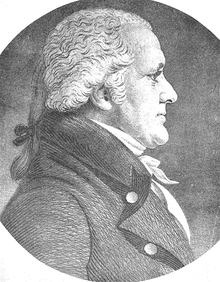Perez Morton
Perez Morton | |
|---|---|
 Portrait of Morton, by Saint-Mémin | |
| Massachusetts Attorney General | |
| In office 1810–1832 | |
| Governor | Elbridge Gerry Caleb Strong John Brooks William Eustis Marcus Morton Levi Lincoln, Jr. |
| Preceded by | Barnabas Bidwell |
| Succeeded by | James T. Austin |
| Speaker of the Massachusetts House of Representatives | |
| In office 1810–1811 | |
| Preceded by | Timothy Bigelow |
| Succeeded by | Joseph Story |
| Speaker of the Massachusetts House of Representatives | |
| In office 1806–1808 | |
| Preceded by | Timothy Bigelow |
| Succeeded by | Timothy Bigelow |
| Personal details | |
| Born | November 13, 1751 Plymouth, Massachusetts |
| Died | October 14, 1837 (aged 85) Dorchester, Massachusetts |
| Spouse | Sarah Wentworth Apthorp |
| Children | Sarah Apthorp Morton (1782–1844); Anna Louisa Morton (1783–1843); Frances Wentworth Morton (1785–1831); Charles Ward Apthorp Morton (1786-1809); Charlotte Morton (1787–1819) |
| Alma mater | Harvard |
| Profession | Attorney |

Perez Morton (November 13, 1751 – October 14, 1837) was a lawyer and revolutionary patriot in Boston, Massachusetts.
Life and career
Morton was born in Plymouth, Massachusetts in 1751, and raised in Boston. His father, Joseph Morton, worked as a tavern-keeper at the White Horse Tavern. Perez attended the Boston Latin School starting around 1760, and Harvard College, graduating in 1771.[2] He was admitted to the Massachusetts bar in 1774.
He participated in the Committee of Safety, and the Committee of Correspondence; he was also a Mason, serving as Deputy Grand Master of the Grand Lodge of Massachusetts in 1789-1790.[3] In 1775-1776, he was Deputy Secretary of the Council of the Colony of Massachusetts Bay.[4] On April 8, 1776, Morton spoke at the memorial service held for Joseph Warren, at King's Chapel.[5]
In 1778, he married Sarah Wentworth Apthorp. Together they had 5 children: Sarah Apthorp Morton (1782–1844); Anna Louisa Morton (1783–1843); Frances Wentworth Morton (1785–1831); Charles Ward Apthorp Morton (1786–1809); and Charlotte Morton (1787–1819)[6][7] From ca.1796 to ca.1803, the Mortons owned a house on Dudley Street in Dorchester; the house may have been designed by Charles Bulfinch.[8] Friends and associates of Morton included James Bowdoin, John Adams, and James Swan.
In 1788, the Mortons were the subject of a public scandal regarding an illegitimate child of Sarah Morton's sister, Fanny Apthorp, rumored to have had an affair with Perez. The scandal was amplified in the press, notably the Massachusetts Centinel and the Herald of Freedom and the Federal Advertiser. A novel published in 1789, The Power of Sympathy, written by a neighbor of the Mortons, William Hill Brown, depicted an adulterous affair between a man and his sister-in-law; at the time, many suspected the novel to be based on the real-life Morton/Apthorp affair.[9]
Morton served as Massachusetts Speaker of the House, 1806–1808, and 1810–1811; and as Massachusetts Attorney General, 1810-1832.[10]
He died in Dorchester in 1837.
Portraits of Morton have been made by Charles Balthazar Julien Févret de Saint-Mémin, and others.[11][12] Some items owned by Perez Morton are now in the collection of the Museum of Fine Arts, Boston, including a silver ladle made by Paul Revere.[12]
Morton's daughter Charlotte was the wife of Andrew Dexter, Jr.[13]
Morton wrote the text of the hymn When Jesus Wept, music composed by William Billings.[14]
References
- ^ "BACK TO DORCHESTER–THE AMERICAN SAPPHO, CHARLES BULFINCH, AND A LITTLE MORE OGDEN CODMAN". The Down East Dilettante. Retrieved 24 November 2021.
- ^ James Spear Loring. The Hundred Boston Orators Appointed by the Municipal Authorities and Other Public Bodies, from 1770 to 1852: Comprising Historical Gleanings, Illustrating the Principles and Progress of Our Republican Institutions. 2nd ed. J.P. Jewett and company, 1852; p.129.
- ^ Proceedings of the Most Worshipful Grand Lodge of Ancient Free and Accepted Masons of the Commonwealth of Massachusetts. 1900.
- ^ Noble, John. "Some Massachusetts Tories." Publications of the Colonial Society of Massachusetts, Transactions 5 (1897–98);p.284.
- ^ Text of speech can be found in: Loring; p.127+
- ^ Oliver, Andrew and James Bishop Peabody, eds. The Records of Trinity Church, Boston, 1728–1830. Publications of the Colonial Society of Massachusetts. Collections 56 (1982).
- ^ Worcester Art Museum. Gilbert Stuart. Sarah Wentworth Apthorp Morton (Mrs. Perez Morton), 1802–20. Retrieved 2011-09-07
- ^ Dorchester Atheneum. Perez Morton, 1750-1837. Retrieved 2011-09-07
- ^ Cathy Davidson. Revolution and the word: the rise of the novel in America. Oxford Univ. Press, 1986; p.83-109.
- ^ Loring, p.130.
- ^ Eleanor Pearson DeLorme. The Swan Commissions: Four Portraits by Gilbert Stuart. Winterthur Portfolio, Vol. 14, No. 4 (Winter, 1979), pp. 361395.
- ^ a b MFA collections
- ^ Mary Caroline Crawford, Famous families of Massachusetts, Volume 2, 1930, pages 146 to 147
- ^ https://hymnary.org/person/Morton_P
Further reading
- Francis B. Heitman. Historical Register of Officers of the Continental Army during the War of the Revolution April 1775, to December 1783. Washington, D.C.: The Rare Book Shop Publishing Company, Inc., 1914.
- Emily Pendleton, Milton Ellis. Philenia: The Life and Works of Sarah Wentworth Morton, 1759-1846. 1931.
- Clifford K. Shipton. Sibley's Harvard graduates; Volume 17, the Classes 1768-1771. 1975.
- Richard Walser. "Boston's Reception of the First American Novel". Early American Literature, Vol. 17, No. 1 (Spring, 1982), pp. 65–74.
- Jane Kamensky. The exchange artist: a tale of high-flying speculation and America's first banking collapse. Viking, 2008; p. 43+
External links
- 1751 births
- 1837 deaths
- People of Massachusetts in the American Revolution
- Boston Latin School alumni
- Harvard College alumni
- Massachusetts Attorneys General
- Speakers of the Massachusetts House of Representatives
- Members of the Massachusetts House of Representatives
- Massachusetts lawyers
- People from Plymouth, Massachusetts
- Politicians from Boston
- 18th-century American people
- 18th century in Boston
- 19th century in Boston
- Lawyers from Boston
- 19th-century American lawyers
